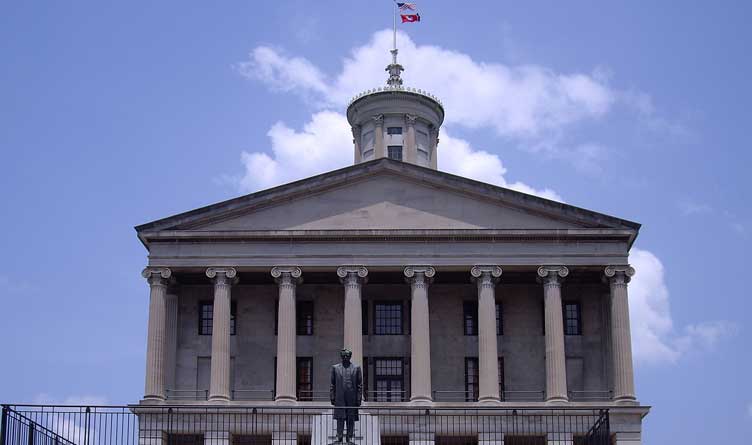Photo: Tennessee State Capitol Building in Nashville – In the foreground is a statue of Edward Ward Carmack (1858 –1908), an attorney, newspaperman, and political figure who served as a U.S. Senator from Tennessee from 1901 to 1907.
Photo Credit: Ron Gogswell
Published February 19, 2021
HB0037 of Tennessee Code Annotated (TCA), Title 50, Chapter 1, Part 2 is amended now saying, “a state or local governmental entity, the governor, or the executive head of a local government shall not, by executive order, ordinance, or resolution, create categories or classes of essential and nonessential businesses, trades, professions, or industries for the purpose of authorizing such categories or classes to remain in operation or requiring the same to cease operation for any purpose if the business, trade, profession, or industry is otherwise lawful in this state.”
The Tennessee capitol further references individuals’ right to work and the necessity of every job to the wellbeing of the people and economy.
As states are now deciding priority for vaccination distribution, classifications of essential and nonessential that were previously used may be obsolete. Tennessee is a state that has used federal guidance on such classifications for workers.
On March 30, 2020, Governor Bill Lee signed Executive Order No. 22, for all nonessential businesses to close and urged people to stay home if possible.
This led to the need to define and provide examples of what is classified as essential and nonessential. Nonessential businesses could still provide services such as delivery and online orders, and essential businesses could remain open but limited, and they should follow the health guidelines.
Executive Order No. 22 outlines activities considered essential and nonessential as follows:
- Essential:
- Medical professionals
- Government personnel-including law enforcement, firefighters, corrections officers, housing and shelter personnel, election operations, child welfare, park services
- Human services personnel-including care facilities and homes, recovery centers, educators
- Infrastructure personnel-including food-related services, farmers markets, transportation, construction, gas stations, utilities, automotive repair
- Miscellaneous-including wedding and funeral services, media, attorneys, hardware and supply, charities, mail, animal shelters and care facilities, agriculture, weather
- Nonessential
- Hair, tanning, and nail salons
- Massage and spa
- Tattoo services
- Night clubs
- Entertainment venues such as bowling alleys, movie theaters, amusement parks, arcades
*Examples are not all-inclusive
As of the passing of this bill, the above classifications are prohibited, therefore eliminating them as grounds for vaccination priority, worker benefits or requirements, and other services such as The Department of Human Services’ 2021 Essential Employee Child Care Payment Assistance program.
This program deemed parents that are employees of healthcare, law enforcement, first responders, military, social services, mail, transportation, restaurants, and grocery stores eligible for childcare support until March 31, 2021—over a month after this bill was passed.
Those who may be affected by the prohibition of essential/nonessential categories should remain attentive for further information on the implications of this bill.
This House bill is highly similar to Senate bill 1573, introduced and passed on first consideration on Feb. 11, 2021.
BH0037 amends TCA Title 4; Title 5; Title 6; Title 7; Title 50, Chapter 1, Part 2; Title 58; and Title 68. These titles relate to state government; counties; cities and towns; consolidated governments; employer and employee; military affairs, emergencies, and civil defense; health, safety, and environmental protection; respectively.
The most recent executive orders by Governor Lee extend previous order provisions (12/22/20) and relate to spectator sports and athletic activities (1/19/21 and 1/28/21).





